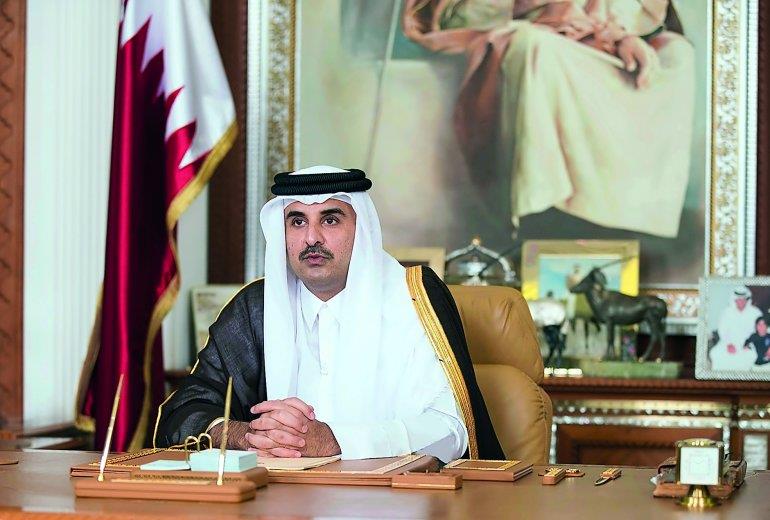62 days on, Qatar defeats siege
By finding new trade partners, exploring new import channels, opening new maritime lines, activating domestic production, Qatar has defeated the nefarious designs of blockading countries to create a crisis in Qatar.
Sixty-two days after the siege, normal life goes on in Qatar with no scarcity of food items. Rather the siege has proved a blessing in disguise with Qatar ensuring speedy completion of its projects to ensure self-sufficiency.
Immediately after imposition of blockade on June 5 by the three Gulf countries, all imports from those countries were halted. To address the temporary shortage of dairy and poultry products in markets, Turkish and Iranian food products hit the shelves of retail outlets.
Turkish exports to Qatar increased 51.5% in June compared to the previous month (May 2017) and reached $53.5m. Food, dairy products, fruits, vegetables, poultry and water topped the list of Turkish exports to Qatar. Till the second week of July, Turkey had sent 197 cargo planes, 16 trucks and one ship to Qatar to meet its daily needs since the crisis started.
During the siege, a Qatari company announced airlifting 4,000 cows from Germany, US and Australia to address country's domestic milk demand in face of a Saudi-led blockade. A number of shipments have already arrived in Qatar.
Apart from imports from Turkey, Iran, India and other countries, many national products like Baladna, Dandy and Ghadeer were, and are available in the local markets to serve daily needs of the residents.
Few days back, in a statement to QNA, Assistant Undersecretary for Agriculture and Fisheries Affairs at the Ministry of Municipality and Environment Sheikh Dr Faleh bin Nasser Al Thani said that new livestock production projects in Qatar included Baladna livestock farm, which targeted 40 percent share in dairy products' market in the country.
Hassad Food has recently announced the launch ‘Iktefa' initiative that aims to turn unproductive local farms into productive ones and increase production. Under the initiative, Hassad will support local farm owners by purchasing their yearly production of fresh vegetables and fruits.
The Turkish government has also signed a deal with Qatar to strengthen co-operation in the agricultural and livestock sectors.
Qatar is also building strategic food security facilities and warehouses at Hamad Port having capacity of providing stockpile of processed and stored food for 3 million people for two years as well as exporting food stuff to regional countries.
Qatari companies are also set to start joint ventures with foreign companies to boost local production. Two days ago, 88 Qatari and 200 Turkish companies met in İzmir to develop commercial relations between the two countries. The first result was an agreement to launch trade between Kocaeli and Doha. To counter the effects of blockade, Doha and Tehran are also willing to discuss land trade routes.
The role of Mwani and Hamad Port has been pivotal in knocking out the challenges posed by the blockading countries and siege.
Hamad Port has successfully broken the siege imposed on Qatar since June 5 with the opening of five new shipping lines. Turkish Economy Minister Nihat Zeybekci said on Friday. 'We're thinking about alternatives for land trade routes with Qatar but the easiest way is passing through Iran, Zeybekci told Anadolu Agency.
In a statement to QNA, the Director of Hamad Port, Captain Abdul Aziz Al Yafei recently said that Hamad Port's new lines connect directly to several ports in the region and beyond such as Sohar and Salalah in Oman, Mundra and Nhava Sheva in India, Izmir in Turkey and other ports served by these international companies from all over the world.
He pointed out that Qatar Ports Management Company (Mwani Qatar) received in the first half of this year up to 470,000 tonnes of general cargo and about 407,000 heads of livestock, in addition to 449,000 tonnes of gabbro and building materials. The Ministry of Transport and Communications has also awarded the contract of part one of the second phase of the Hamad Port for $2bn.

Legal Disclaimer:
MENAFN provides the
information “as is” without warranty of any kind. We do not accept
any responsibility or liability for the accuracy, content, images,
videos, licenses, completeness, legality, or reliability of the information
contained in this article. If you have any complaints or copyright
issues related to this article, kindly contact the provider above.
Most popular stories
Market Research

- Cartesian Launches First Outsourced Middle-Back-Office Offering For Digital Asset Funds
- R0AR Launches Buyback Vault: Bringing 1R0R To R0AR Chain Unlocks New Incentives
- FBS Analysis Shows Ethereum Positioning As Wall Street's Base Layer
- Bydfi Joins Korea Blockchain Week 2025 (KBW2025): Deepening Web3 Engagement
- Ethereum Based Meme Coin Pepeto Presale Past $6.6 Million As Exchange Demo Launches
- Moonbirds And Azuki IP Coming To Verse8 As AI-Native Game Platform Integrates With Story






















Comments
No comment